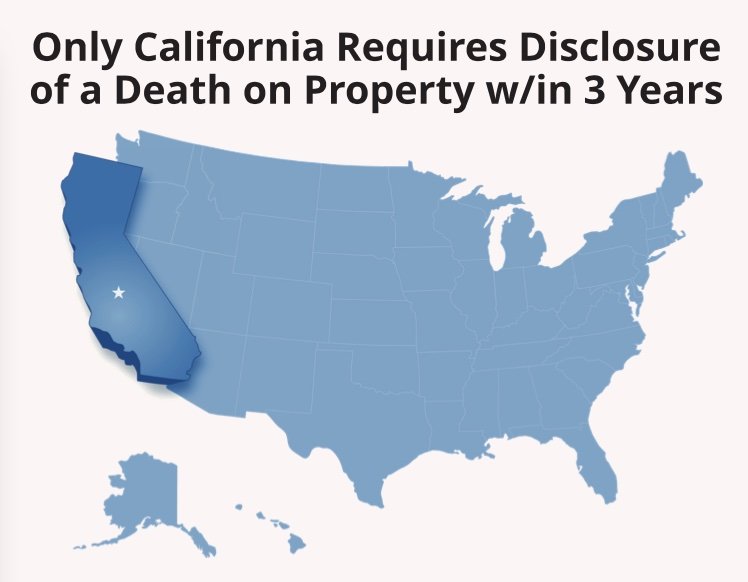
At this particular moment in the real estate market, a substantial share of homes for sale in Manhattan Beach and the South Bay are being offered for sale after the death of an owner. Sometimes, in the house.
We've almost lost count of the number of times recently that we've read in the MLS notes some language like, "Owner passed away peacefully in the house from natural causes."
Sometimes there's color, like the number of years the person lived in the house, or even their age (in one case, 102 years old!).
This is not meant to be at all crude, but: Who cares?
Do you care if someone died in a house that you're looking to buy?
We've had buyer clients say to us several times recently, "I don't care if someone died there. I hope other people care, though." (Less competition.)
One buyer client literally said that hearing about a death on the property made them feel good. It felt like something of a validation, like it's a good house that you'd want to stick around in. "Maybe I'll die there, too!"
 Certainly, some people just don't like it. The happy glow that seems to surround a house that could become one's new home suddenly dims, as people consider a vaguely icky feeling. Maybe they don't really believe there will be ghosts or anything like that, but they also don't want to put their bed right where the previous resident passed.
Certainly, some people just don't like it. The happy glow that seems to surround a house that could become one's new home suddenly dims, as people consider a vaguely icky feeling. Maybe they don't really believe there will be ghosts or anything like that, but they also don't want to put their bed right where the previous resident passed.
And there are some cultures where a recent death in the house can be understood to be a big negative. That downside is mitigated if the death was natural and came after what seems a normal, long lifespan. But the negatives multiply if there was disease, great torment, tragedy or (gulp!) murder.
Truthfully, on that last one, it's hard to disagree: a "murder house" is always going to be a challenge.
California Disclosure Requirements
 California has some of the strictest disclosure laws regarding a death on a property for sale.
California has some of the strictest disclosure laws regarding a death on a property for sale.
If a death occurred within 3 years of the time that the home is offered for sale, this must be disclosed upfront to potential buyers. (This is the reason we keep reading it in MLS notes. But there's no requirement to put the death in all the advertising.)
If a death ever occurred on the property in prior years, and the seller knows about it, that fact must be disclosed upon inquiry from a potential buyer. (Please do not construe this article as legal advice; please consult your own real estate broker or lawyer if you have questions about disclosure issues.)
It's somewhat amazing to see how rare any death-disclosure requirements are across the United States. Most states require a buyer to ask, sometimes in writing. Maybe people living in areas with 250-year-old houses get a bit less worked up about an inevitable history of deaths in those houses?
One of the only fairly common laws seems to be that if someone died in the house as a result of a problem with the house (they fell through the rotted floorboards, toxic mold, etc.), then the death must be disclosed. Well, yeah, that's a material defect. ("This house might kill you, too!")
We've got a story to share, after we address the question right below.
Why Are So Many Properties with Recent Deaths Now on the Market?
There are two factors at work that probably contribute to the seemingly larger proportion of sales resulting from recent deaths, and neither of those two factors is covid.
One is the tight-inventory market we're experiencing today. Major life changes (death, divorce, job transfer) are perennial reasons for homes to be sold, but they're more common among the crop of homes for sale when there are fewer "discretionary" sellers, like people just looking to upgrade.
 The second may be less obvious, but it's a fairly new California law. The voters passed Proposition 19 in November 2020, changing a few things relating to property taxes. Relevant to this discussion, Prop. 19 requires reassessment of the value of inherited property that is kept in the family as a rental, not a primary residence of a family member.
The second may be less obvious, but it's a fairly new California law. The voters passed Proposition 19 in November 2020, changing a few things relating to property taxes. Relevant to this discussion, Prop. 19 requires reassessment of the value of inherited property that is kept in the family as a rental, not a primary residence of a family member.
That 1960s tax basis on the property? Gone. Property taxes will be based on current value, typically a gigantic step up in the monthly cost of holding the property.
For that and other tax-related reasons, family members inheriting property now may find it more sensible to sell, rather than to hold onto a property. And that was, to be clear, precisely the intention behind that part of Prop. 19.
(Please do not construe this article as tax advice; please consult your own tax professional or lawyer if you have questions about the tax implications of holding property.)
A Scary Story, and Why Deaths Are Disclosed Now
We had buyer clients looking at a North Redondo house a few years back, and there were cryptic MLS notes encouraging agents to inquire about the situation with death on the property.
Naturally, we asked. It was not a death within 3 years. It went back a couple decades or more. But it was a murder – a double murder, in fact.
 The story was that some previous buyers of the home didn't know about the murder at all. They didn't know until one day, more than a year after they had moved in, when there was a knock at the door.
The story was that some previous buyers of the home didn't know about the murder at all. They didn't know until one day, more than a year after they had moved in, when there was a knock at the door.
Who was it?
It was the prosecutor, who had brought along the jury. They were there to view the crime scene.
THE CRIME SCENE?!?!?
Why, yes, we're trying a man for the murder of his wife and his coworker here at the house.
That's definitely not the way you want to find out about a death at the house you've bought.
Some people who knew hadn't said anything to the buyers about what happened. Let's just say, it didn't reflect well on the real estate profession.
That's just one of 1,000 stories that led to rules that now require disclosure of a death on property.
Even if you don't really care.
Please see our blog disclaimer.
Listings presented above are supplied via the MLS and are brokered by a variety of agents and firms, not Dave Fratello or Edge Real Estate Agency, unless so stated with the listing. Images and links to properties above lead to a full MLS display of information, including home details, lot size, all photos, and listing broker and agent information and contact information.


 Certainly, some people just don't like it. The happy glow that seems to surround a house that could become one's new home suddenly dims, as people consider a vaguely icky feeling. Maybe they don't really believe there will be ghosts or anything like that, but they also don't want to put their bed right where the previous resident passed.
Certainly, some people just don't like it. The happy glow that seems to surround a house that could become one's new home suddenly dims, as people consider a vaguely icky feeling. Maybe they don't really believe there will be ghosts or anything like that, but they also don't want to put their bed right where the previous resident passed. California has some of the strictest disclosure laws regarding a death on a property for sale.
California has some of the strictest disclosure laws regarding a death on a property for sale. The second may be less obvious, but it's a fairly new California law. The voters passed
The second may be less obvious, but it's a fairly new California law. The voters passed  The story was that some previous buyers of the home didn't know about the murder at all. They didn't know until one day, more than a year after they had moved in, when there was a knock at the door.
The story was that some previous buyers of the home didn't know about the murder at all. They didn't know until one day, more than a year after they had moved in, when there was a knock at the door.